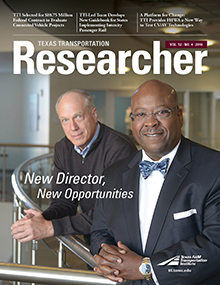As part of a new Texas Department of Transportation (TxDOT) project, Texas A&M Transportation Institute (TTI) researchers are looking into Texans’ attitudes on marijuana use and analyzing the traffic safety impacts in states that have legalized, decriminalized or made marijuana available for medical purposes.

Several U.S. states have relaxed their marijuana laws, and during the 2016 election, four more states legalized recreational marijuana use. In 2015, Texas legalized the use of low-tetrahydrocannabinol (THC) marijuana oil for patients with certain medical conditions. But its effect on driving is not really known, and the Governors Highway Safety Association has recognized this as a key traffic safety area needing further study.
“As our country moves toward more relaxed marijuana use and possession laws, more research is needed on the impact that will have on traffic safety,” says TTI Assistant Transportation Researcher Jena Prescott, principal investigator on the project.
Data from the National Highway Traffic Safety Administration’s 2013–2014 National Roadside Survey of Alcohol and Drug Use by Drivers show alcohol use prior to driving is decreasing, while drug use (specifically marijuana) is increasing.
“With the passage of the 2015 law, learning more about the traffic safety implications of medicinal and legalized marijuana use is critical for the future of our state,” says Troy Walden, director of TTI’s Center for Alcohol and Drug Education Studies.
As part of the TxDOT project, titled Marijuana and Driving: A Look at Texans’ Attitudes and Impact on Driving Under the Influence, researchers will:
- survey residents of Texas counties on attitudes toward marijuana use;
- conduct a literature review of the effects of marijuana use on the human body, the driving task and crash risk;
- conduct a crash analysis of drug-impaired-driving crashes (fatal and serious injury) in Texas from 2010 to 2015 and compare them to similar crashes in states with decriminalized marijuana laws; and
- conduct a policy review of Washington, Alaska, Colorado, Oregon (states where marijuana use is legal), Washington, D.C., and Texas.
Researchers will also create public education and outreach materials to be used in impaired-driving outreach and education campaigns in the Lone Star State.
“We will look at the crash factors and work to determine the types of crashes that are more likely to be drug involved,” says Prescott. “We hope to determine the degree to which relaxed marijuana laws impact crashes in states with these new laws and their neighboring states.”

